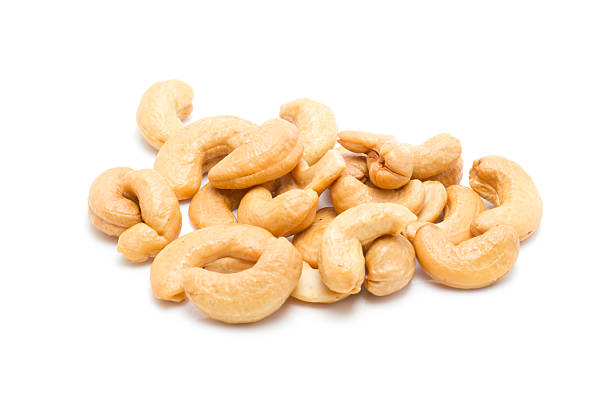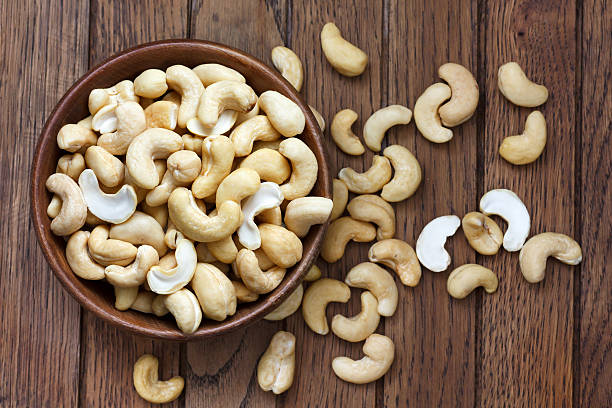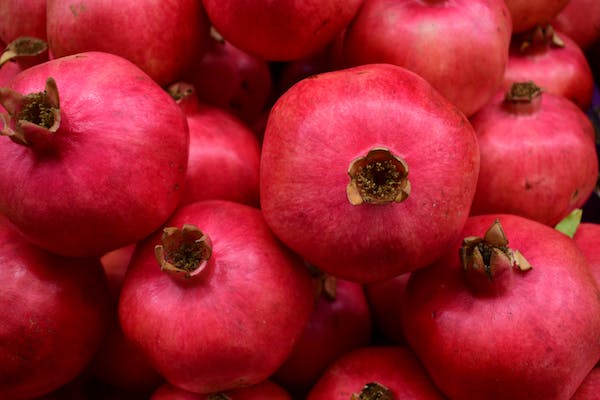-
Cashews are rich in protein, fiber, healthy fats, vitamins, and minerals.
-
They provide a variety of health benefits, such as better heart health, lower cholesterol, and stronger bones.
-
Cashews can be included in your diet in a number of ways, such as as a raw or roasted snack, as well as in cereal or trail mix, pesto, hummus, and other dips.

The cashew seed is frequently used as a snack nut (cashew nut), cooked into cashew cheese or cashew butter, or consumed on its own. Similar to the tree, the nut is frequently referred to as a cashew.
The kidney-shaped nuts, which are popular in a variety of culinary recipes, provide much more than flavor. Cashews are stacked with various assortment of health benefits for anyone hoping to work on their eating routine and general health.
Cashews can be used as a sauce base in savory meals or to add richness and nutrients to salads and stir-fries. They can be eaten alone or with dried leafy foods vegetables
Nutrition Information of Cashews
Understanding the richness of cashews in essential nutrients will help you appreciate their positive impact on your health. Cashews are rich in a range of nutrients. One ounce (28 grams) of unroasted, unsalted cashews provides you with around:
-
Calories: 157
-
Protein: 5 grams
-
Fat: 12 grams
-
Carbs: 9 grams
-
Fiber: 1 gram
-
Copper: 67% of the Daily Value (DV)
-
Magnesium: 20% of the DV
-
Manganese: 20% of the DV
-
Zinc: 15% of the DV
-
Phosphorus: 13% of the DV
-
Iron: 11% of the DV
-
Selenium: 10% of the DV
-
Thiamine: 10% of the DV
-
Vitamin K: 8% of the DV
-
Vitamin B6: 7% of the DV
Benefits of Cashews for Health
1. Improved Heart Health
Cashews are essential for improving heart health. These supplement thick nuts are bountiful in monounsaturated and polyunsaturated fats, particularly oleic acid, which can reduce the levels of LDL (bad) cholesterol, which can be deadly.
Moreover, they supply a sound measure of potassium and magnesium, two minerals that are good for blood pressure regulation. If you want to have a healthy heart, cashews are a good addition to your diet.
2. Stronger Bones
Cashews are not only essential for your heart but also for the health of your bones. Cashews contain essential minerals like magnesium and phosphorus, both of which play a crucial role in maintaining strong and healthy bones.
Magnesium aids in absorbing calcium, which is significant for bone mineralization, whereas phosphorus promotes bone structure and strength.
Cashews can help to conquer the likelihood of bone-related problems such as osteoporosis, making sure that your skeletal system remains robust and resilient throughout your life.
Whether you’re young or aged, including cashews in your diet can be a tasty method to strengthen your bones and promote long-term skeletal health.
3. Promotes Weight Loss
Cashews have a lot of calories, yet they can still help you lose weight. They are rich in fiber, protein, and good fats, all of which help you feel satisfied and full. By reducing your overall calorie consumption and regulating your appetite, cashews can help you manage your weight.
Furthermore, the monounsaturated fats in cashews can increase the body’s fat-burning systems.
Cashews can be a delightful and nutritious snack when included in a balanced diet, assisting in your quest for a healthier weight without sacrificing flavor or nutrition.
4. Better Digestion
In addition to being a delightful treat, cashews are believed to help digestive health. Cashew nuts are high in dietary fiber, which helps keep the digestive tract in good health.
Fiber gives the stool bulk, which helps to promote regular bowel motions and prevent constipation.
Cashews also have a few organic chemicals that can activate your body’s digestive enzymes and facilitate the breakdown and absorption of nutrients from your diet.
You may help your digestion run more smoothly and effectively by including cashews in your diet, which will keep your gut content and improve your general wellbeing.
5. Diabetes Management
Cashews can be a beneficial nut to the diets of diabetics. They contain a low glycemic index, which means they have little effect on blood sugar levels when ingested in moderation. Also, the fiber content of cashews inhibits sugar absorption, which helps to balance blood glucose levels.
Cashews’ healthful fats also help to increase insulin sensitivity. However, they must be eaten wisely and healthily and as part of a diet that is well-balanced in order to receive these advantages.
Consider incorporating cashews as a healthy and delectable snack if you have diabetes so that you may better control your blood sugar levels.
6. Lower Cholesterol
Cashews give a natural solution to improve cholesterol profiles and promote heart health. Monounsaturated fats, particularly oleic acid, are heart-healthy and can help lower LDL (bad) cholesterol levels. Cashews include phytosterols, which are plant chemicals that compete with cholesterol absorption in the gut, contributing to reducing cholesterol levels.
Recipe Cashews
A Simple Creamy Cashew Chicken Stir-Fry Ingredients:
-
1 lb. boneless, skinless chicken breasts, cut into strips
-
1 cup broccoli florets
-
1 red bell pepper, sliced
-
1/2 cup unsalted cashews
-
2 cloves garlic, minced
-
1/4 cup low-sodium soy sauce
-
2 tbsp honey
-
2 tbsp creamy cashew butter
-
1 tbsp olive oil
-
Cooked rice or noodles for serving
Instructions
-
Chicken should be cooked in a pan with hot olive oil
-
Take out of the pan and place aside
-
Add bell pepper, broccoli, and garlic to the same pan
-
Stir fry the vegetables until they are crisp-tender
-
Soy sauce, honey, and cashew butter should be thoroughly combined in a small bowl
-
Add the cashews and cooked chicken back to the pan before adding the sauce
-
Stir-fry everything until thoroughly hot and coated





